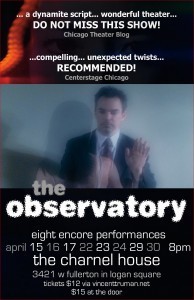Reflections on "The Observatory" 2.0

When I finally sat down to write "The Observatory", I decided to continue my trend of writing myself a small role in order to add some laughs and punch to the play. If nothing else, I know how to twist scripts and get laughs. So I wrote the part of Victor, the charming and sadistic government agent (not from the FBI, as one reviewer suggested, and not in the future, as claimed by another – I'm all for reviewers projecting their feelings, but when they project my plot points, they're piss poor at their job).
Having myself in mind for the role of Victor allowed me to have quite a lot of fun at the expense of one of the main roles, that of David Lockwood. Even with Victor offstage, I still relished in Victor-izing David throughout the show, tormenting him with his own weaknesses, foibles and vulnerabilities until he is crushed under the weight of them.
In early 2011, I had a breakfast meeting with a couple of fellow creative types and we ruminated on the idea of combining our powers under one umbrella. This unnamed entity was to be used to promote each other's works and be on hand for each other to work with. It was decided that, to launch this none-too-ambitious idea, we would remount "The Observatory" to capitalize on the very positive reactions we received from the December 2010 run (and – this should be underscored – we all liked the play anyway).
Like most garage band philosophies, the idea of the creative umbrella didn't survive long after our french toast, pancakes and omelettes made their way back into the public water supply. However, by this time, I was financially committed to remounting "The Observatory", so that was that. From the first run came Angela Jo Strohm and Kasey O'Brien, both of which have outstanding talent, infinite charm and magnificent noses. In line with creative evolution, we all took on more ambitious roles this time around: Angela, who had understudies the role of Marissa, took on the principal role of Sally Lockwood, as well as became the main director. Kasey, who had understudied Sally in the first show, moved up to take on the principal role of Marissa, as well as assistant director.
Right around this time, I heard an interview with Ken Finkleman, a particular hero of mine, in which he was asked why he chose to produce, direct, write and star in his various TV shows. He responded, "would you ask a painter why he decided to paint the entire canvas?"
With that, I decided to take on the lead role of David Lockwood.
Now, as I mentioned above, I did delight in torturing our poor David when I wrote the script, but what I didn't realize is that the tools I used to create a mental Guantanamo Bay in David's mind – the insecurity, the vulnerability, the loss of worth, the fear of being mediocre – are exactly my fears. And David and I get to share them with everyone for an hour and fifteen minutes. Oops.
Over the last six weeks, it's been a circle of hell that Dante didn't even think of.
There were two saving graces to being so emotionally naked in front of the rest of the cast: (1) no one was aware I was really terrified and vulnerable and (2) Angela and Kasey were always there. I have grown very reliant on their opinions and have come to trust them implicitly. This is not a common thing in theater, no matter what anyone says. I cannot hug them enough.
Love is the cast member with the longest resume. And she's not even Equity.



